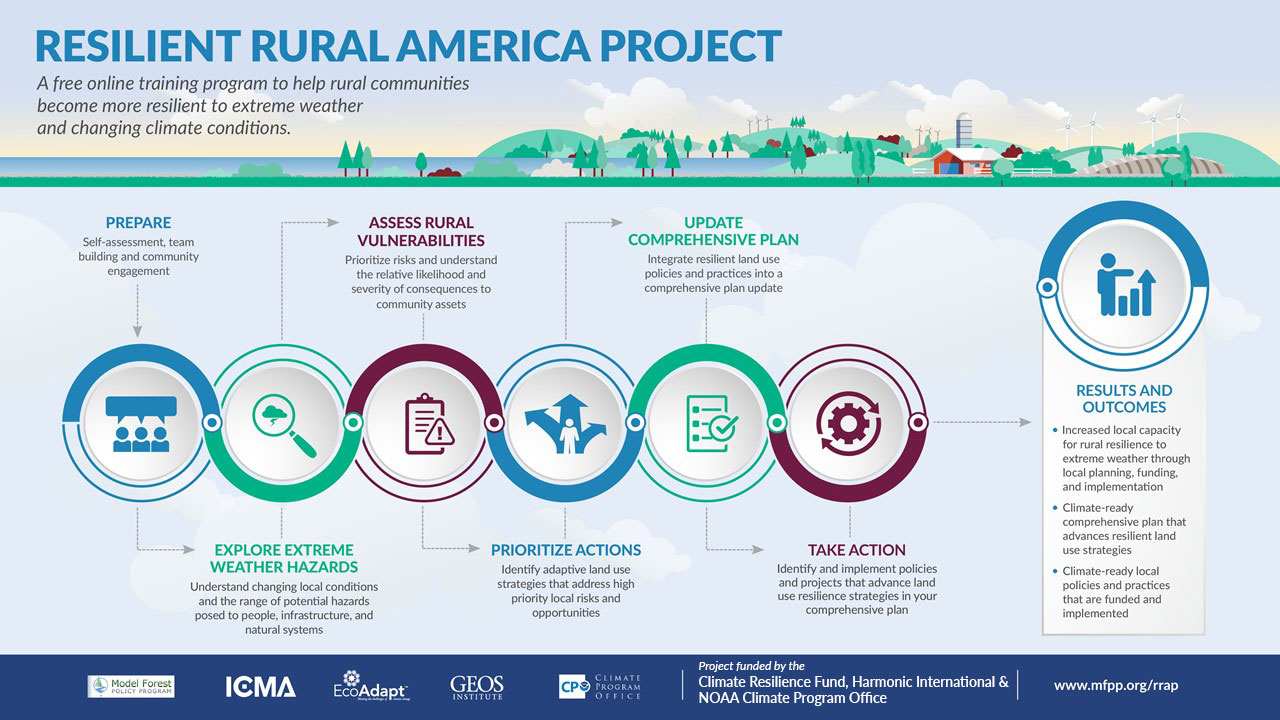Module # 01 Rural Resilience to Extreme Weather: Integrating Land Use Strategies in Comprehensive Plans
Welcome!
Welcome to the Rural Resilience Training Series, brought to you by the collaborative Resilient Rural America Project (RRAP). This is RRAP Training Module # 01, a step-by-step streamlined process to consider how extreme weather affects your rural community and how to adapt to those changing conditions during your comprehensive plan update process.
The module includes a workbook and facilitated online process to:
- Understand current impacts and future risks from extreme weather;
- Identify options for land use strategies to increase resilience; and
- Integrate actionable resilience policies into comprehensive plan updates
The online module is primarily designed for time-efficient individual or group training prior to the comprehensive planning process. Individuals or small groups are encouraged to complete the training prior to the next plan update process. You can then use the online module and workbook as an in-depth reference guide to integrate resilience during the real-time community-based plan update process.
The module is designed for use by community leaders in rural jurisdictions (e.g.elected officials, planners, agency staff, natural resource managers, and other stakeholders). It will also be a useful resource for consultants or partners to rural jurisdictions who provide project or technical support.
Get Started:
- Read Using the Online Training Module (below);
- Set up Your Account with User Name, Contact Information, and Password;
- Take the Self-Assessment Questionnaire and the Rate Your Knowledge Preview; and
- Go To the Land Use Module to begin

Using the Online Training Module and Workbook
The training module is a self-guided process that you will complete at your own pace. We estimate contact time of approximately 15-20 hours, plus a variable amount of time required for researching local information.
The module is organized around a sequence of planning steps. If you are starting from scratch with no prior risk assessment or planning, it is best to complete each Phase before advancing to the next.
The training module includes the online portal, a downloadable workbook, and a series of downloadable worksheets.
If you have already completed a risk assessment and/or have developed resilience strategies through a different framework, you may opt to review Step 1.4.2 and then move on to Phase 5, which focuses on the detailed steps of integrating resilience strategies into your comprehensive plan. Be sure that you have some version of the following in place, before starting Phase 5: 1) Clear purpose statement for resilience integration to identify why this is important to do; 2) Prioritized list of extreme weather current impacts and future risks with supporting data; 3) Prioritized list of potential resilience strategies, including short, medium and long term land use strategies.
This RRAP Training Series is hosted by the Model Forest Policy Program on behalf of the project collaborative. The RRAP Modules are available for free public use. To set up a free account, you will need to provide your name, location, affiliation, and email address for access to training materials.

Acknowledgments:
The Resilient Rural America Project (RRAP) is a collaborative project produced by the Model Forest Policy Program, International City/County Management Association , EcoAdapt, Geos Institute , and NOAA Climate Program Office. The Rural Resilience Training Series is made possible with funding from the Climate Resilience Fund, Harmonic International, and the NOAA Climate Program Office.
The module was co-produced with the help of rural leaders and climate experts. We are grateful for the participation of volunteers in the co-production of this training module. We thank the rural leaders who provided in-depth feedback as module beta testers, and the panel of expert project advisors for their review and insights as service providers to rural communities. We recognize and appreciate the following contributors to the process for Module #01:
Rural Leaders Serving as Module Beta Testers
- Gabrian McPhail; Community Development & Engagement, Town of Vinalhaven, ME
- Jessica Carey, Assistant Planner, Mariposa County, CA
- Katherine Allison, Vanderbilt University Master’s Candidate, for Sumner County, TN
- Nicholas Zimny-Shea, Energy, Water, & Floodplain Manager, Indiana Borough, PA
- Stephanie Walters, Planning & Zoning Official, Indiana Borough, PA
Contributing Expert Project Advisors
- Barrett Ristroph, JD, Ristroph Law, Planning and Research
- Joanna Wozniak-Brown, PhD, Regional Planner, Northwest Hills COG, CT
- Kyle Breuer, Planning Director, Pender County, NC
- Mark Megalos, NCSU, Cary, NC
- Megan Susman, Office of Community Revitalization, US EPA
- Pablo Beimler, Community Outreach Coordinator, Hawaii Wildfire Management, HI
Website Development by Alyx Perry